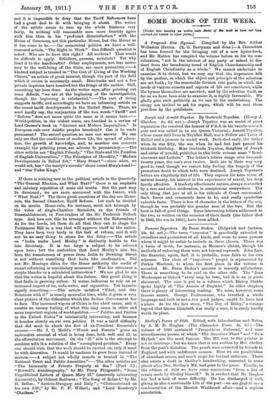If there is nothing new in the political article in
the Quarterly, "The General Election, and What Next ? " there is an emphatic and salutary repetition of some old truths. But the past may be dismissed ; we are more concerned with the future, with "What Next ? " The three great questions of the day are Home- rule, the Second Chamber, Tariff Reform. Let each be decided on its merits. Home-rule, for instance, must not triumph by the votes of single-Chamber Socialists, or the friends of Disestablishment, or Free-traders of the Sir Frederick Pollock type. And how can this be arranged without the Referendum? As for the Lords, let them do all that they can to shape the Parliament Bill in a way that will approve itself to the nation. They have been very tardy in the task of reform, and it will not be an easy thing to atone for the delay.—The article on "India under Lord Morley" is distinctly hostile to the late Secretary. It is too large a subject to be entered upon here ; but the contention that Lord Morley's aim has been the transference of power from India to Downing Street is not without something that looks like confirmation. Did not Mr. Montagu claim for the Home authority the credit of recent reforming or conciliatory measures? Was his utterance a simple blunder or a calculated indiscretion ? We are glad to see that the writer is hopeful about the future. One great thing is that India is growing richer. It seems ludicrous to rely on an increased import of ice, soda-water, and cigarettes. Yet luxuries signify something.—The article entitled "Tibet, and Our Relations with it" is mostly neutral in tone, while it gives a very clear picture of the difficulties which the Indian Government has to face. The increased vigour of China is the chief cause, and it creates an uneasy feeling of what this may mean in other and more important regions of world-polities.—" Politics and Parties in the United States" is intrinsically interesting, and because it touches closely on our own politics. It was a tariff difficulty that did most to check the flow of ex-President Roosevelt's success.—Mr. J. C. Medd's "Woods and Forests" gives an instructive account of what is being done, both well and ill, in the afforestation movement. On the "ill" side is the attempt to combine with it a solution of the "unemployed problem." Every one should wish that the work should be carried on, only it must be with discretion. It would be madness to grow trees instead of mutton.—A subject not wholly remote is treated in "The National Trust and Public Amenities."—The other articles are "The Immunity of Private Property at Sea" (Part I.) ; " Boswell's Autobiography," by Mr. Percy Fitzgerald ; "Some Unpublished Letters of Queen Mary IL" (curiously interesting documents), by Colonel Bathurst; "The Song of Roland," by Mr. H. Bello° ; "Austria-Hungary and Italy " ; "Chateaubriand on his own Life," by Mr. P. F. Willert; and "Lord Rosebery's 'Chatham."'






















































 Previous page
Previous page